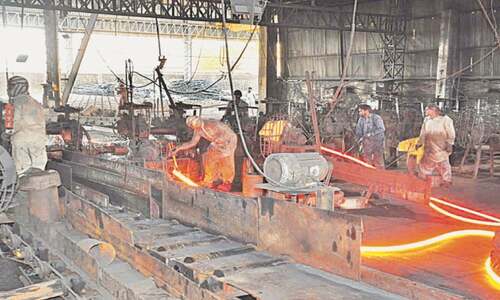
ISLAMABAD: Large-scale manufacturing (LSM) expanded for the second consecutive month in September, with year-on-year growth of 1.01 per cent, reversing a trend of 14 months of contraction, data released by the Pakistan Bureau of Statistics showed on Wednesday.
The LSM expansion can be attributed mostly to a government move to make it easier to open letters of credit (LCs) after being restricted to a few consumers and essential sectors.
The removal of import restrictions, clearance of outstanding LCs, and improved dollar liquidity in the markets following an increase in SBP foreign reserves contributed towards the pick-up in economic activity.
The LSM expansion can primarily be attributed to increased production within the garments sector, followed by food, petroleum products and pharmaceutical products.
In September, 14 sectors out of 22 picked up positive growth including food (1.38pc), wearing apparel (47.94pc), pharmaceuticals (29.53pc), petroleum products (17pc), electrical equipment (3.92pc), machinery and equipment (148.21pc), chemicals (1.70pc).
The LSM marginally grew 0.68pc in the first quarter of the current fiscal year from a year ago.
However, the textile sector’s production shrank 21.76pc in September over a year ago. Major negative growth originated from yarn (29.79pc) and cloth (17.20pc). Nominal growth was reported in the production of other products. The production of garments grew 47.94pc in September.
In the food group, wheat and rice production declined by 7.69pc in September over the last year. However, the production of cooking oil surged by 33.18pc, and blended tea by 14.22pc. However, vegetable ghee output declined by 1.75pc during the month under review.
Petroleum products posted a positive growth of 17pc in the third month of 2023-24, mainly because of an increase in the production of petrol (18.47pc) and high-speed diesel (29.59pc), LPG (10.76pc), kerosene 6.38pc while almost all other petroleum products recorded a negative growth.
There was a notable decline in iron and steel production, which experienced a decrease of 1.74pc in September. However, the production of electrical equipment witnessed an increase of 3.92pc.
The production of fertilisers rose by 2.23pc, while the production of rubber items contracted by 2.08pc. The production of pharmaceuticals posted an impressive increase of 29.53pc.
The auto sector witnessed a 22.88pc slump in September as the production of almost all kinds of vehicles went down. The auto industry remained under pressure due to ongoing inflationary pressures and tight auto financing. The downturn was evident across all categories except tractors.
Published in Dawn, November 16th, 2023
















































Dear visitor, the comments section is undergoing an overhaul and will return soon.